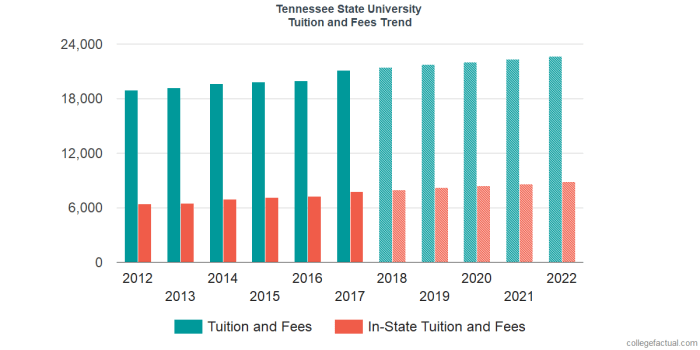Navigating the financial landscape of higher education can be daunting, but understanding the tuition structure at Tennessee State University is a crucial step in planning for your academic journey. This guide will provide an in-depth exploration of tuition costs, scholarships, financial aid options, and strategies for managing expenses, empowering you to make informed decisions about your educational investment.
Tennessee State University offers a diverse range of academic programs and opportunities, and its tuition structure reflects this commitment to accessibility and excellence. By understanding the various components of tuition, you can effectively budget and plan for your time at TSU, ensuring that financial concerns do not hinder your academic pursuits.
Overview of Tuition Costs at Tennessee State University

Tennessee State University (TSU) offers a variety of tuition options to meet the needs of its diverse student body. The cost of tuition varies depending on a student’s residency status and academic program.
In-state students pay the lowest tuition rates, followed by out-of-state students. International students pay the highest tuition rates.
Additional Fees and Expenses
In addition to tuition, students may also need to pay fees for:
- Housing
- Meal plans
- Books and supplies
- Transportation
- Health insurance
Breakdown of Tuition Expenses

Understanding the various components of tuition-related expenses is crucial for budgeting and financial planning. Tennessee State University offers a transparent breakdown of its tuition costs, allowing students and families to make informed decisions.
Tuition Rates
Tuition rates at Tennessee State University vary based on factors such as residency status, academic level, and program of study. In-state students typically pay lower tuition rates compared to out-of-state students. Graduate students generally pay higher tuition rates than undergraduate students.
- Undergraduate In-State Tuition: $10,700 per year
- Undergraduate Out-of-State Tuition: $21,400 per year
- Graduate In-State Tuition: $11,500 per year
- Graduate Out-of-State Tuition: $23,000 per year
Fees
In addition to tuition, students are also responsible for paying various fees that cover administrative costs, student services, and facilities maintenance.
- Student Activity Fee: $150 per semester
- Technology Fee: $100 per semester
- Health Service Fee: $120 per semester
- Parking Fee: $150 per year (optional)
Other Charges
Students may also incur additional charges depending on their individual circumstances.
- Late Registration Fee: $100
- Transcript Fee: $10
- Returned Check Fee: $30
Scholarships and Financial Aid Options
Tennessee State University is committed to making education affordable for all students. The university offers a variety of scholarships and financial aid programs to help students cover the cost of tuition.
To be eligible for most scholarships and financial aid programs, students must meet certain requirements, such as having a minimum GPA, being a resident of Tennessee, or demonstrating financial need.
How to Apply for Scholarships and Financial Aid
Students can apply for scholarships and financial aid by completing the Free Application for Federal Student Aid (FAFSA). The FAFSA is available online at https://studentaid.gov/h/apply-for-aid/fafsa.
Once students have completed the FAFSA, they will receive a Student Aid Report (SAR). The SAR will list the amount of federal financial aid that students are eligible to receive.
Students can also apply for scholarships from private organizations. Many private organizations offer scholarships to students based on their academic achievement, extracurricular activities, or other criteria.
Types of Scholarships and Financial Aid
Tennessee State University offers a variety of scholarships and financial aid programs, including:
- Academic scholarships
- Athletic scholarships
- Need-based scholarships
- Grants
- Loans
The amount of financial aid that students receive will vary depending on their financial need and the type of aid that they are awarded.
Comparison with Other Universities

Tennessee State University’s tuition costs are comparable to those of other similar universities in the region. To provide a clearer perspective, let’s compare the tuition rates and fees at TSU with those of other institutions.
Tuition Costs at Different Institutions
| University | In-State Tuition | Out-of-State Tuition | Fees |
|---|---|---|---|
| Tennessee State University | $9,888 | $20,004 | $1,464 |
| Middle Tennessee State University | $10,386 | $21,390 | $1,230 |
| University of Memphis | $10,698 | $22,302 | $1,350 |
| Austin Peay State University | $9,390 | $19,350 | $1,170 |
| University of Tennessee, Knoxville | $11,592 | $25,002 | $1,476 |
As evident from the table, TSU’s tuition costs fall within the range of other universities in the region. While TSU’s in-state tuition is slightly lower than that of some institutions, its out-of-state tuition is somewhat higher. This variation in tuition costs can be attributed to several factors, including the university’s size, location, and academic programs offered.
Planning for Tuition Expenses
Planning for tuition expenses at Tennessee State University is crucial to ensure a smooth and successful educational journey. This section will provide guidance on how to budget effectively, explore alternative funding sources, and manage debt to make the most of your educational investment.
Effective budgeting involves creating a realistic plan that Artikels your income and expenses. Start by determining your total tuition costs, including tuition, fees, and other expenses. Then, consider your income sources, such as scholarships, grants, work-study programs, or part-time employment. It’s important to allocate your income wisely, prioritizing essential expenses like tuition and living costs.
Managing Debt
If you need to borrow money to cover tuition expenses, it’s essential to manage debt responsibly. Explore federal student loans, which offer competitive interest rates and flexible repayment options. Consider private student loans as well, but carefully compare interest rates and terms to find the best fit for your financial situation. It’s wise to avoid excessive debt and only borrow what you need to cover necessary expenses.
Exploring Alternative Funding Sources
Beyond scholarships and student loans, there are alternative funding sources to explore. Consider employer tuition assistance programs, which may provide financial support to employees pursuing higher education. Research external scholarships and grants offered by organizations and foundations that align with your interests and academic achievements. Additionally, you can explore work-study programs that allow you to earn while you learn.
FAQ Section
What is the tuition rate for in-state students at Tennessee State University?
For the 2023-2024 academic year, the tuition rate for in-state undergraduate students is $8,688 per year.
Are there any additional fees or expenses beyond tuition?
Yes, in addition to tuition, students may need to pay fees for technology, student services, and health insurance. These fees vary depending on the student’s program and enrollment status.
What types of financial aid are available to students at Tennessee State University?
TSU offers a variety of financial aid options, including scholarships, grants, loans, and work-study programs. Students are encouraged to explore all available options to minimize their out-of-pocket expenses.
How can I apply for financial aid at Tennessee State University?
To apply for financial aid, students must complete the Free Application for Federal Student Aid (FAFSA). The FAFSA is available online at fafsa.gov.




